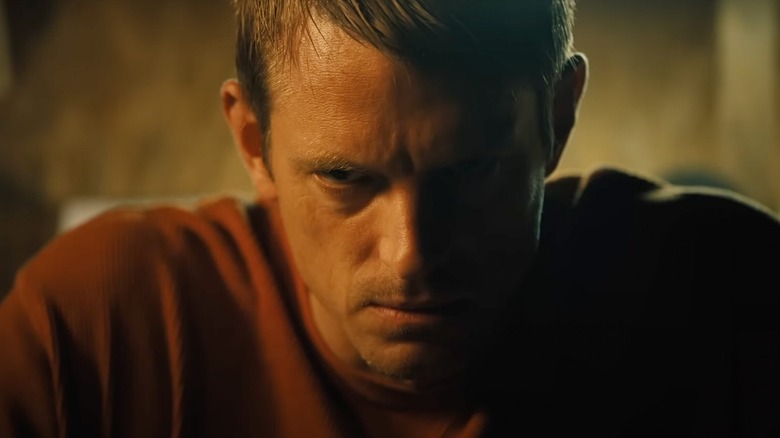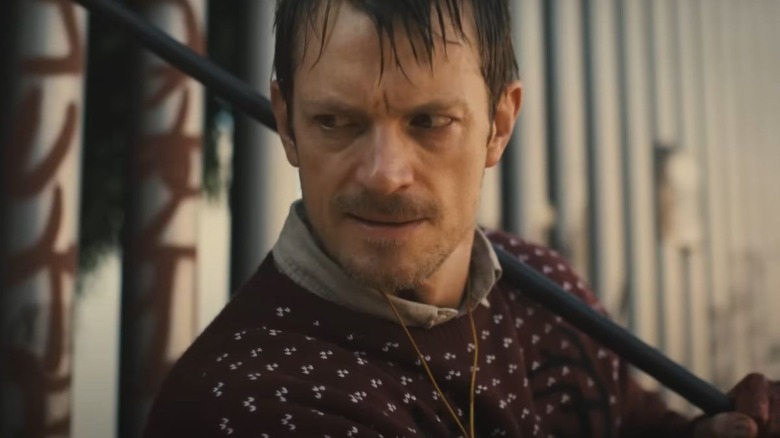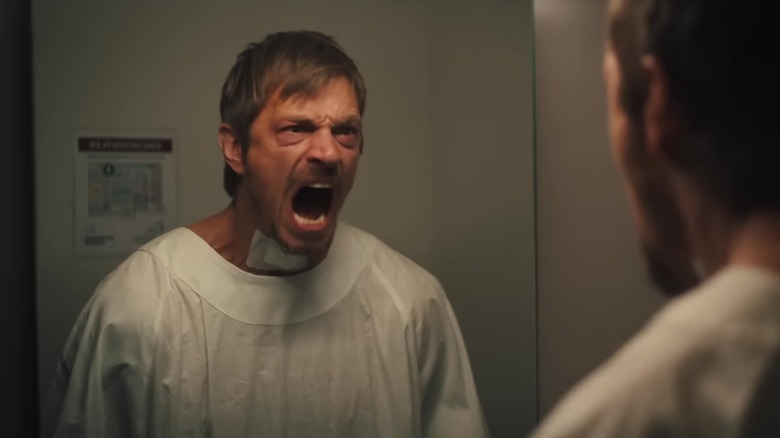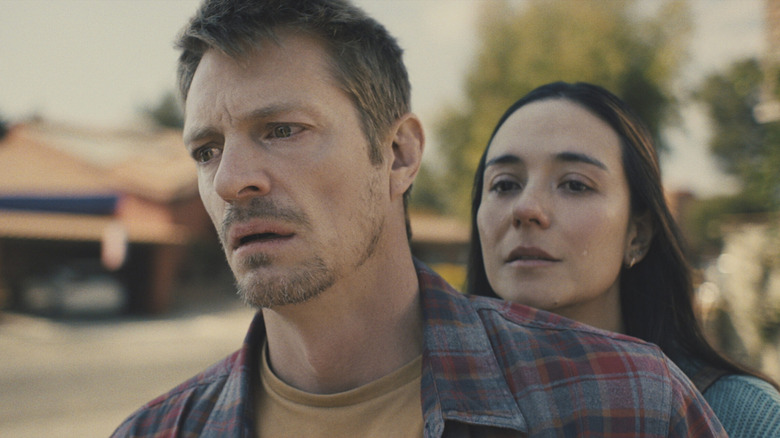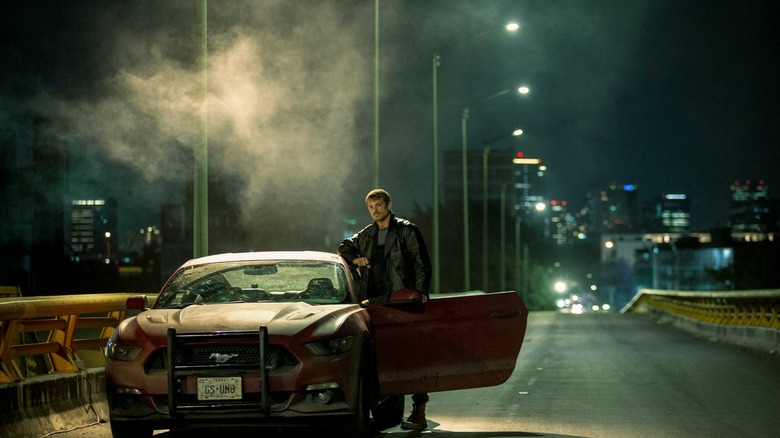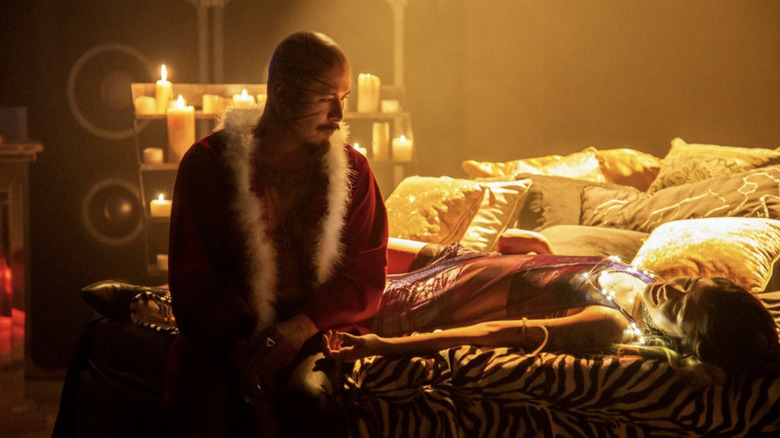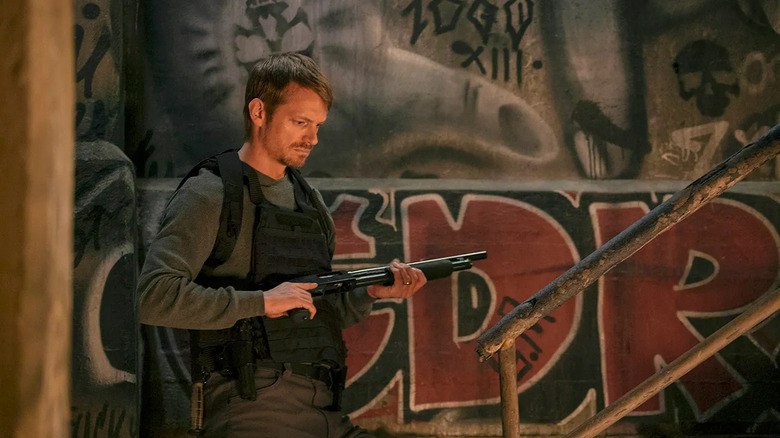Silent Night Ending Explained: Rest In (Heavenly) Peace
Seeking revenge as a result of being wronged is akin to a crime of passion: you're miffed at being mistreated, and so your rage takes over your mind before (or unless) cooler heads prevail. Seeking revenge as a result of profound loss, however, hews closer to pre-meditated obsession, the hole in your life slowly but surely filling up with a need for retribution until your life isn't for you and your loved ones anymore: it's all about getting payback.
Many action revenge thrillers explore this concept, and they generally feature characters who are already well-versed in the ways of killing. The theme of revenge becoming an all-consuming force, however, is best expressed with characters who used to be ordinary average folks before an enormous wrong or loss changes them forever, and not necessarily for the better. John Woo's latest action opus "Silent Night" — his first in Hollywood since 2003's "Paycheck" — explores this theme in a way that's unique to both Woo's oeuvre and action thrillers in general. It's a film with virtually no dialogue, and one that isn't as action-packed as the Hong Kong filmmaker's past work has tended to be.
Yet the movie packs a considerable punch, particularly in the way the lead character is drawn further into an abyss of revenge, and in the way it uses its Christmas background to comment on the way people tend to use the last major holiday of the year as a sort of moral tallying both for themselves and others. If Christmas is supposed to be about Good triumphing over Evil, and no God or Santa Claus is around to ensure that happens, should a mere mortal take matters into his own hands? And if they do, how far is too far?
Shepherds quake at the sight
During the long tracking shot that opens "Silent Night," a red balloon wafts by the camera, which is not only a foreshadowing element for a flashback scene later on, but an allusion to Albert Lamorisse's 1956 short "Le Ballon Rouge" (aka "The Red Balloon"), a film about a young boy finding a sentient (and, apropos of this film, mute) red balloon.
That childlike iconography quickly gives way to mayhem, as Brian Godlock (Joel Kinnaman) tears down the street of a town in New Mexico, clad incongruously in a Christmas sweater and chasing two cars full of gang members firing assault weapons at each other. Even though it appears Godlock has nothing to do with this gang war, he makes it his business to get involved, adding to the mayhem and taking a few gang members down himself.
When he is finally able to face his target, the gang leader known as Playa (Harold Torres), he's instantly subdued by the criminal and shot in the throat for good measure. Left for dead, Brian (whose last name is a clever, cruel spin on the phrase "good luck" by screenwriter Robert Archer Lynn), is rescued before he bleeds out.
All is quiet, not calm
From the moment Brian wakes up in his hospital room, his life is irrevocably changed. First and foremost, his throat injury means that he no longer has use of his vocal cords. While many people with similar afflictions can maintain a decent life using alternative methods of communication, Brian petulantly sees the loss of his voice as a major setback, rejecting the use of an artificial larynx device. That's partly because of the rage that has already consumed him, something best seen when he tries to scream at his reflection in a bathroom but no sound comes out. Now that his anger can't be released through his voice, it seems, it must be released another way.
At first, that way is alcoholism for Brian. Despite the support of his wife Saya (Catalina Sandino Moreno) — who, of course, is suffering the loss of her child as much as Brian is — Godlock falls into a drunken depressive episode. As he looks around his home, complete with Christmas decorations that neither he nor Saya can bring themselves to take down, we're shown what brought Brian to this state. The day before last Christmas, Brian and Saya were playing on their lawn with their young son (Anthony Giulietti), only for the boy to be killed by a stray bullet as the warring gang members sped by in their vehicles. When the kid is killed, a single red balloon tied to his Christmas present flies up into the air, as good a visual metaphor as any for both the boy's soul flying away along with his father's innocence.
As Brian and Saya's relationship deteriorates, he begins to obsess over obtaining justice for his son's murder. At the local police station, Brian attempts to speak with Detective Vassell (Scott Mescudi), whose card he received while he was in hospital. Seeing how distracted Vassell seems to be, coupled with spotting Playa's rap sheet and mug shot posted on Vassell's wall, Brian leaves the detective's office without a word, forming a new plan of his own.
Radiant beams from thy furious face
Vigilante movies have been around since the dawn of cinema, particularly if one accepts the broader definition of "characters taking the law into their own hands" as a vigilante film. (In this way, movies like 1938's "The Adventures of Robin Hood" and 1940's "The Mark of Zorro" can be included.) While vigilantism threaded through various periods and genres (especially the Western, in films like "The Searchers" and "The Sons of Katie Elder"), the subgenre really came into its own with the dawn of the Urban Vigilante thriller, beginning with rogue cops ("Dirty Harry") and continuing with average people pushed toward violence. 1974's "Death Wish" popularized this latter mode, with star Charles Bronson adopting the screen persona of a vigilante more or less for the rest of his career.
"Silent Night" certainly homages "Death Wish" in the way it makes Playa and the rest of the gangs in the film less real people and more a monolithic Other for Brian to rage against. Yet while "Death Wish" reflects the fears of affluent white people toward urban crime made rampant by broken system(s), Woo, Kinnaman, and the film aren't blithely making Brian out to be a righteous man: he throws away his booze and turns all his attention to using gym equipment, watching YouTube fight and weapon training videos and purchasing other such accouterments like a police band scanner. When he begins having panic attacks in public and seeing other people's children as his own dead son, it's clear that Brian is going off the deep end.
Soon enough, he goes too far for Saya, and the couple grows further apart from each other with each passing day. As Saya says her silent goodbye to Brian, the man inherently knows that this separation was unavoidable, almost as if he realizes his own darkness. It's too late to turn back, however: he's marked December 25 as the day to, in his words, "KILL THEM ALL."
Hole-y night
When Christmas Eve finally rolls around, Brian takes his new Santa-from-Hell persona out on the town. Pointedly, his year of training hasn't made him an unstoppable killing machine; he makes mistakes, gets beat up, and has to improvise almost as much as he hits his target. Case in point, he captures one of Playa's upper-echelon gang members and brings the man back to his lair in the garage. Despite Godlock's insane mission, he has the foresight to attempt to bring the entire organization down rather than just eliminate the top players, using his captive to make a written confession and outline of their whole crime enterprise. That confession happens — eventually, after Brian almost loses control of his prey, and is only able to subdue him with some, ahem, good luck.
With the incriminating (and bloody) document in hand, Godlock then delivers it to Vassell's doorstep. It's clear that Vassell has been attempting to do his due diligence concerning Playa and his gang in the intervening year since Brian's tragedy, too, and so the arrival of Brian's document spurs him into further action.
Meanwhile, Brian has taken his war to the streets, using his guns to shoot a myriad of holes into the gangster's vehicles, not to mention their bodies. At one point, he attempts to save a female officer in distress, but once again his amateur status proves he's no Superman. The loss of the woman also demonstrates that no one will be shown mercy this Christmas, Brian included.
Bullets stream from heaven afar
Eventually, Brian fights his way to Playa's abandoned warehouse headquarters. In one long, seemingly unbroken take, Godlock cleans house, clearing the stairs and each floor's landing of baddies while steadily taking damage himself. The film's mercilessness peaks as Brian encounters Playa's girlfriend, who had publicly humiliated Brian earlier in the film as he was stalking Playa and studying the gangster's movements. Initially attempting to spare her life, she turns on him, almost taking him out, forcing him to murderously retaliate.
Fortunately for Brian, he happens to have at least one remaining friend in the world: Vassell, who shows up in the nick of time to help Godlock by taking a few gangsters out himself. While Woo and Lynn's conceit that "Silent Night" be dialogue-less borders on gimmickry, it makes the movie and the characters feel that much more operatic (a Woo staple, naturally), fusing the silent-but-strong cool of Jean-Pierre Melville and Alain Delon's collaborations with the "pure cinema" of Alfred Hitchcock (another of Woo's heroes, as evident by "Mission: Impossible 2" homaging Hitchcock's "Notorious," for instance).
As Godlock, Vassell, and Playa all encounter each other, there's a sense of tragic destiny to go along with the action movie's video-game-esque structure. When Vassell is wounded and taken out of the fight early on, Brian and Playa's duel runs its messy, violent course, with both men eventually finding themselves mortally wounded.
All is bright
Despite the final act of "Silent Night" serving up the non-stop action a John Woo film promises, it's remarkably nuanced in its delivery of vengeance-fueled mayhem. In particular, Brian is shown to be extremely mentally and morally unstable: while choking Playa to death, he has a vision of his son, almost as if he's about to realize that all this hatred and violence won't bring his kid back, nor act as true justice for the gangster's actions. However, Brian pointedly doesn't have this moral epiphany, and only chokes Playa harder. Though he's finally able to kill his prey, the victory is hollow. Is Brian a man so consumed by rage and loss that he's lost his soul? Or did he barely have one to begin with, the veneer of husband and father masking the murderous monster beneath until it was unleashed?
Perhaps Brian himself doesn't know, and "Silent Night" leaves that ambiguity unresolved. Instead, it seems the only true victory lies in death, as Brian is freed of his body and his life. His soul travels upwards much like his boy's balloon did at the beginning, seeing his kid's face reflected in the shiny baubles decorating Playa's bedroom, baubles that resemble Christmas decorations. When Saya later visits the grave of her son and ex-husband, she pays her respects, and perhaps has the realization that she lost them both on the same Christmas Eve; it just took a little longer for the father to follow the son to oblivion. If the Christmas holiday and the song "Silent Night" takes its name from advocates for anything, it's peace, and if nothing else, at least the Godlocks have found theirs.
